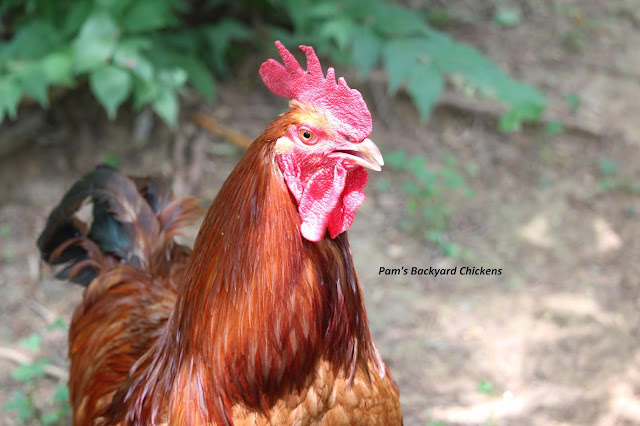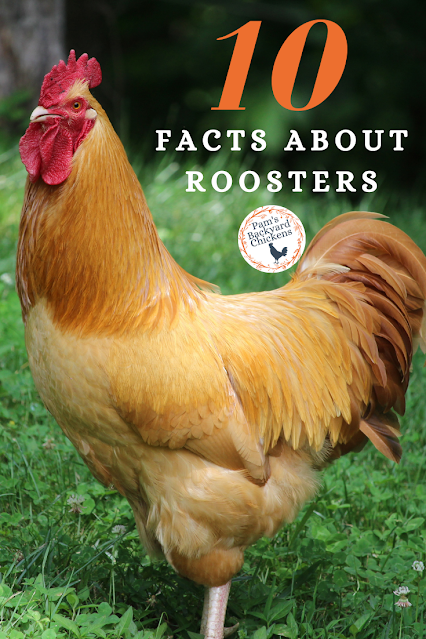1. Roosters Equal Self-Sufficiency
A rooster gives you control over the destiny of your flock and ultimately your food. No longer are you dependent on ordering day-old chicks or hatching eggs. If you’ve got an incubator, or even better, a broody hen, then you can expand your flock as it suits your needs.
Rule of Thumb — Remember that about half the eggs you hatch will be roosters so each hatch can bring some new layers along with the meat for the freezer.
Rooster Trivia — Do you need a rooster to have your hens lay eggs? The short answer is no. This may seem trivial to chicken keepers, but it’s actually the most asked question people have about chickens. You do not need a rooster to have chicken eggs. Hens will lay eggs regardless of whether a rooster is around or not. A rooster’s job is the fertilization of those eggs.
Pin the image below to save this information for later.
How a person looks often helps guide humans as they find a mate and it’s the same with chickens. It’s all about genetic destiny for both hens and roosters. An outward appearance of health and vigor provides a glimpse into the future indicating the ability to provide strong offspring.
Hens tend to favor roosters with a large red comb with tall points. Evenly formed wattles and long spurs are also must-haves. Long, shiny, and colorful hackle and saddle feathers are used as a rooster puffs up and displays for a hen.
3. Roosters Equal Protection
A rooster can be the ticket to safety for your hens. A rooster wants to live on through his offspring and you don’t have offspring if you don’t have a group of hens that are safe. A good rooster will take this duty seriously and keep an eye out at all times for trouble.
It’s not unusual to observe a rooster busily pecking while tilting an eye up to the sky or scanning the perimeter. If he spots something, a rooster warns the flock with a series of low noises. This tells the rest to stay close to him and remain vigilant. If the danger doesn’t pass, he will quickly sound the alarm by squawking loudly and gathering his flock in a safe area to hold them there until the danger passes. If needed, a rooster will attack a predator to keep it away. This is appropriate aggressive rooster behavior. But sadly, there are stories of roosters being injured and even losing their lives as they’ve defended their flocks.
4. Multiple Roosters Can Live Together in a Flock
Roosters can live with other roosters. If you want to have multiple roosters, it is easier to keep them together if they are all raised together from a young age.
If you have an established flock with a rooster, it is easier to introduce new roosters while you introduce new hens. Some do have success in introducing adult roosters.
Keep in Mind — Roosters will establish a pecking order as they learn how to get along. This can be messy and there can be injuries. Be prepared to tend to wounds and to intervene if things get out of hand. Also, be aware that some roosters may never get along.
Did You Know? — Some people set up bachelor pad chicken coops devoted entirely to their roosters.
5. Roosters Have Hardy Sperm
The normal body temperature of a chicken is between 105 degrees and 107 degrees. Roosters do not have a penis. A rooster’s sperm is produced and carried inside his body and stays viable at body temperature. Once a rooster has mated, his sperm can stay viable inside a hen’s body for up to two weeks.
6. The Sun Rules Rooster Reproduction
We all know that light influences a hen’s laying cycle, but did you know that it also influences a rooster’s fertility? A rooster’s sperm and testosterone are produced in his testes. These testes shrink and grow seasonally. A rooster's comb and wattles also grow and shrink seasonally as they are used to attract hens.
7. Roosters Don't Always Eat First
While foraging, roosters often come across food and tasty treats but they won't always be seen eating those treats. Instead, the rooster can be found standing close to the treat and tidbitting. This is a behavior where the rooster clucks softly and moves his head up and down while picking up bits of food and dropping them. A rooster’s long wattles are said to be helpful in gaining a hen’s attention while he’s tidbitting. The hens will then eat first and the rooster will eat anything that’s left over. This ensures the hens stay healthy to raise a rooster’s offspring.
8. Roosters Will Keep Order Among the Hens
A rooster is fully aware of the pecking order established in his flock and he will help to keep hen squabbling to a minimum. If there is no rooster in a flock, a dominant hen will usually take this role.
9. Roosters Don't Always Rule the Roost
Roosters and hens don’t live in exclusive pairs. A rooster will mate with all the hens in a flock. If you have more than one rooster, then a hen may mate with different males. But this is where the hen takes a lead role. If she doesn’t want offspring from a particular rooster, usually the less-dominant rooster, then she can “dump” his sperm.
10. Rooster Spurs Grow Continuously
A rooster’s spurs grow throughout his life. Some roosters are good at keeping their spurs maintained at a reasonable length; others are not. If that’s the case, human intervention may be needed. Spurs that are too long can cause damage when mating with hens. They can also interfere with a rooster’s gait as his spurs hit the opposite legs.
🐓Roosters Have Zodiac Rock Star Status
The rooster is the only bird in the Chinese Zodiac Calendar.
It’s not unusual to observe a rooster busily pecking while tilting an eye up to the sky or scanning the perimeter. If he spots something, a rooster warns the flock with a series of low noises. This tells the rest to stay close to him and remain vigilant. If the danger doesn’t pass, he will quickly sound the alarm by squawking loudly and gathering his flock in a safe area to hold them there until the danger passes. If needed, a rooster will attack a predator to keep it away. This is appropriate aggressive rooster behavior. But sadly, there are stories of roosters being injured and even losing their lives as they’ve defended their flocks.
4. Multiple Roosters Can Live Together in a Flock
Roosters can live with other roosters. If you want to have multiple roosters, it is easier to keep them together if they are all raised together from a young age.
If you have an established flock with a rooster, it is easier to introduce new roosters while you introduce new hens. Some do have success in introducing adult roosters.
Keep in Mind — Roosters will establish a pecking order as they learn how to get along. This can be messy and there can be injuries. Be prepared to tend to wounds and to intervene if things get out of hand. Also, be aware that some roosters may never get along.
Did You Know? — Some people set up bachelor pad chicken coops devoted entirely to their roosters.
5. Roosters Have Hardy Sperm
The normal body temperature of a chicken is between 105 degrees and 107 degrees. Roosters do not have a penis. A rooster’s sperm is produced and carried inside his body and stays viable at body temperature. Once a rooster has mated, his sperm can stay viable inside a hen’s body for up to two weeks.
6. The Sun Rules Rooster Reproduction
We all know that light influences a hen’s laying cycle, but did you know that it also influences a rooster’s fertility? A rooster’s sperm and testosterone are produced in his testes. These testes shrink and grow seasonally. A rooster's comb and wattles also grow and shrink seasonally as they are used to attract hens.
7. Roosters Don't Always Eat First
While foraging, roosters often come across food and tasty treats but they won't always be seen eating those treats. Instead, the rooster can be found standing close to the treat and tidbitting. This is a behavior where the rooster clucks softly and moves his head up and down while picking up bits of food and dropping them. A rooster’s long wattles are said to be helpful in gaining a hen’s attention while he’s tidbitting. The hens will then eat first and the rooster will eat anything that’s left over. This ensures the hens stay healthy to raise a rooster’s offspring.
8. Roosters Will Keep Order Among the Hens
A rooster is fully aware of the pecking order established in his flock and he will help to keep hen squabbling to a minimum. If there is no rooster in a flock, a dominant hen will usually take this role.
9. Roosters Don't Always Rule the Roost
Roosters and hens don’t live in exclusive pairs. A rooster will mate with all the hens in a flock. If you have more than one rooster, then a hen may mate with different males. But this is where the hen takes a lead role. If she doesn’t want offspring from a particular rooster, usually the less-dominant rooster, then she can “dump” his sperm.
10. Rooster Spurs Grow Continuously
A rooster’s spurs grow throughout his life. Some roosters are good at keeping their spurs maintained at a reasonable length; others are not. If that’s the case, human intervention may be needed. Spurs that are too long can cause damage when mating with hens. They can also interfere with a rooster’s gait as his spurs hit the opposite legs.
Bonus Fun Facts!
🐓Rooster is a Relatively Recent Term
The term rooster refers to an adult male chicken. This term didn’t appear until 1772. Before that, an adult male chicken was called a cock. When that term became considered rude, it generally fell out of favor, however in some countries and in poultry shows today, that term is still used. A young male chicken under a year old is called a cockerel.🐓Roosters Have Zodiac Rock Star Status
The rooster is the only bird in the Chinese Zodiac Calendar.





A fantastic blog with a lot of useful information. I would love to get updates from you. Keep blogging. All the best.
ReplyDeleteChicken Coop
Thank you! I'm so glad you enjoy the blog!
DeleteThank you so much for solving the shrinking comb and wattles mystery. So it can be seasonal when he testes shrinks. I'm relieved because I've been reading some frightening things about this on other blogs!! Thanks again!
ReplyDelete